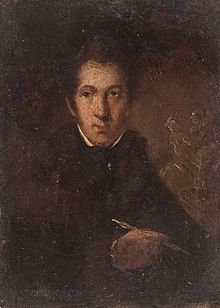Edward Villiers Rippingille
| Edward Villiers Rippingille | |
|---|---|

Self-portrait, in oil on copper
|
|
| Born | c. 1790 King's Lynn, Norfolk |
| Died | 22 April 1859 |
| Nationality | English |
| Known for | Oil painting, Watercolour |
Edward Villiers Rippingille (c. 1790–1859) was an English oil painter and watercolourist who was a member of the informal group of artists which has come to be known as the Bristol School. In that group he was a particularly close associate of both Edward Bird and Francis Danby.
Rippingille was born in King's Lynn, Norfolk, the son of a farmer. His year of birth is now believed to be c. 1790 rather than 1798, as previously thought. In 1813 he exhibited at the Norwich Society of Artists, and showed Enlisting at the Royal Academy.
He moved to Bristol, where he participated in the sketching activities of the Bristol School. Rippingille's Sketching Party in Leigh Woods (c. 1828) depicts a sketching excursion in Leigh Woods typical of those made by the school's members. He worked particularly closely with Edward Bird, and was influenced by Bird's genre painting, which was naturalistic and freshly coloured. In 1814 they both exhibited works at the Royal Academy with the same subject, The Cheat Detected. Rippingille was also a close friend of Francis Danby, and his style developed alongside that of Danby under Bird's influence. In 1819 Rippingille had a success at the Royal Academy with The Post Office. In 1822 the Royal Academy saw The Recruiting Sergeant, a work following the style of Bird, and The Funeral Procession of William Canynge to St Mary Redcliffe, 1474. These works were among Rippingille's finest achievements in the fields of genre and historical painting respectively.
He exhibited by himself at the new Bristol Institution in 1823, and in 1824 was one of the organisers of the first exhibition there by local artists. In 1824 he exhibited The Stage Coach Breakfast at the Royal Academy. This is his best known painting. It depicts some of the literary figures associated with Bristol: Samuel Taylor Coleridge, William Wordsworth and Robert Southey.
...
Wikipedia
